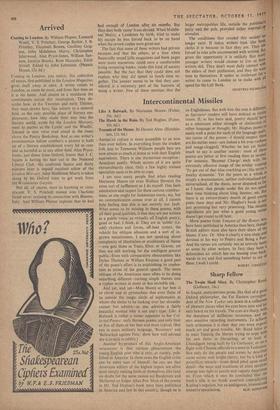Intercontinental Missiles
-AMERICAN culture is more accessible to us now than ever before. In everything from the crudest folk jazz to Tennessee Williams people here are now almost as much, a }tome as with their English equivalents. There is one Mysterious exception : American poetry. Whole sectors of it are quite extraordinarily alien. Only a few highly trained specialists seem to be able to cope.
I am sure many people find when reading Marianne Moore .(or even Wallace Stevens) the same sort of bafflement as I do myself. One feels admiration and respect for these curious construc- tions, as one might for Indonesian music, say, but no communication comes over at all. I cannot help .feeling that this is not entirely our fault. What seems to be missing in these poems, with all their good qualities, is that they are not written in a public voice, as, virtually all English poetry, good or bad, I think, is. They are in 'subtle' (i.e. odd) rhythms and forms, off-beat syntax, the vehicle for oblique allusions and a sort of in- grown tentativeness. I am not speaking about complexity of illustration or eruditeness of theme —one gets those in Yeats, Eliot, or Graves; yet they are still working for the intelligent general public.-Even with comparative obscurantists like Dylan Thomas or William Empson a good part of the poem's effort is in establishing its creden- tials in terms of the general speech. The more oblique of the Americans seem often to be doing sornething different—turning simple themes into a cypher written in more or less invisible ink.
And yet, and yet—Miss Moore at her best is so clever and so pyrotechnic that even those of us outside the magic circle of sophomores at whom she seems to be looking over' her shoulder cannot but admire—as one admires a fairly beautiful woman who is not °he's type. Like A Bulwark is rather a minor appendix to her Col- lected Poems: only thirteen poems, and only four or five of them at her best and most typical. (But
two in more ordinary language, 'Rosemary' and 'Bulwarked against Fate,' show how well advised she is to stick to oddity.)
Another by-product of this Anglo-American mesentente is that curious phenomenon the
young English poet who is only, or mainly, pub- lished in America. In these cases the English critic can be more sure of himself—he can. see that American editors of the highest repute are often quite simply making fools of themselves, like (and no doubt for the same reason as) Baudelaire and Mallarmd on Edgar Allan Poe. Most of the poems in Mr. Ted Hughes's book have been published in America and few in this country, though he is
an Englishman. But with him the case is different, as Spectator readers will have noticed in recent issues, If, as has been said, poetry should have,. as a minimum either strength or distinction 01 either language or thought, Mr. Hughes passes in easily with a point for each of the language quali- ties (some of the poems—I should suspect the are his earlier ones—are indeed a bit over-verbose and image-clogged). Whether he has yet found much to say is another matter : most of these poems are better at first reading than at second. For instance, 'Bayonet Charge', ends with the extremely effective image of the soldier running `To get out of that blue crackling air/His terror's touchy dynamite.' Yet the poem as a whole is simply a dramatisation, neither individualised nor Universalised, of the thesis, never disputed as far as I know, that people under fire do. not- sPend, their time thinking about king, honour, etc. flui there is an extraordinary dearth of good young poets these days and Mr. Hughes's book is not just promising but very promising. The missing ingredients' are just What a good young Writer doesn't get round to till later.
More poeMs, from Tenants of the House, tn°: have been published in America than here, thougn British editors must also have their share of the blame, if any. Dr. Abse is clearly a nice chap, and devoted in his way to Poetry and Being a poet' And his verses are certainly not so actively nastY as some by abler writers. In fact, they have a defenceless air which has me leaning over back- wards to try and find something better to sa Of them. I wish I could. ROBERT CONQUEST.


































 Previous page
Previous page